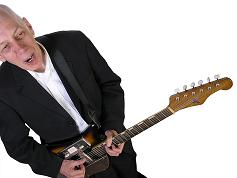|
Rod Clements saw considerable chart success with folk-rockers Lindisfarne, penning their hit Meet Me On The Corner. Now an established solo artist, his new retrospective double-album, Rendezvous Café, has just been released. Rod is proud to have worked with the late, great Bert Jansch, and he continues to collaborate with various other kindred musical spirits including Michael Chapman, Rachel Harrington, and Rab Noakes. We trust you’ll enjoy the latest of Rod’s musings in which you’ll find he’s
NICELY OUT OF TUNE

A folk club organiser I know has created a bit of a local furore by banning singers from reading their lyrics as they’re performing. Predictably, this has provoked wails of protest, but I know which side I’m on: if you’re going to sing a song, you should know the words. I don’t have any objection to using a discreet prompt-sheet, placed out of sight, with a few key words on it to help remind you of a new or unfamiliar song – I do it myself sometimes. But the recent increase in open mike nights and the like (don’t get me started) has ushered in a wave of laptops, iPads and phones as well as conventional music stands with sheets of paper, and it’s not a good look.
One of the things that distinguishes the likes of us from the classical music fraternity is our ability to play by ear, without written music, and many ‘straight’ musicians wish they could do the same. We should be proud of that distinction and if we can do that, the least we can do is learn the words of the songs we sing. Knowing the lyrics honours the writers’ work, shows a commitment to the material, and makes for a more convincing performance.
We can all be afflicted by momentary lapses of memory, of course, but a seasoned performer can handle that, and – provided it doesn’t happen too often – audiences will accept it as part of the live experience.
Anyway, the crib-sheet method is no insurance against such accidents – things can go wrong with music stands and hi-tech devices alike, and if you’re dependent on them, you’re scuppered.
Even the best-equipped performers can come unstuck if they haven’t done their homework. There’s a story about a top American stadium rock band embarking on a tour to promote their new album. Come the opening night, the singer still hadn’t learned the lyrics, so he hit on the idea of covering the stage with large cue-sheets made from rolls of wallpaper with the words written in big letters with thick felt pen.
Unfortunately he’d forgotten that the show’s visual effects included the generous use of dry ice which rolled across the stage in swirling clouds as the band came on, and he spent most of the set improvising gobbledygook as he frantically tried to kick away the billowing white fog that obliterated his handiwork.
Given the circumstances, he might just have got away with it. But in a small club there can be no disguising the fact that a singer is relying on outside help, and the visible presence of a music stand or laptop, besides being distracting, tells the audience one big truth in a single glance: the singer doesn’t know the words.
I’ve even seen people reading the lyrics of their own songs as they’re singing them and to me that is lazy and dishonest. If they can’t be bothered to learn the words, why should we think them worth listening to? It dishonours the centuries-old oral tradition of the performer getting up and sharing their experience (or somebody else’s) with those who have come to listen.
A young performer I know, an enthusiastic contributor to many an open mike night, proudly showed me a foot-operated controller he’d just bought for his iPad. With it, he could scroll through the lyrics and flip from one song to the next as he read from the screen prominently clipped to his mike stand. Wouldn’t it be easier, I suggested (somewhat to his chagrin), just to learn the words? It would certainly be cheaper. And more honest.
|